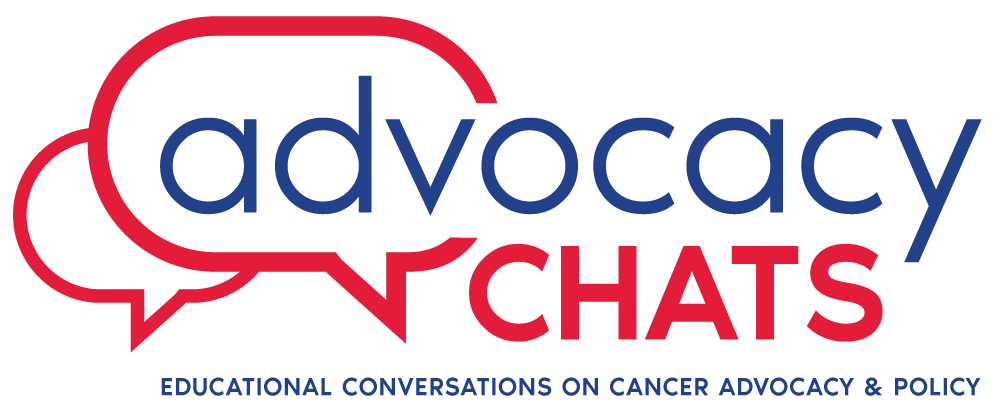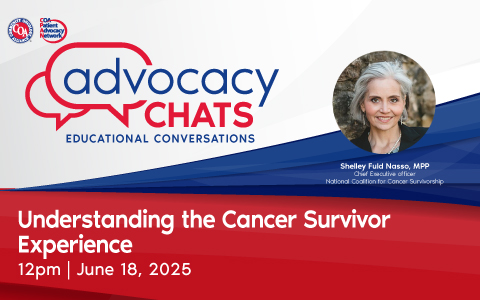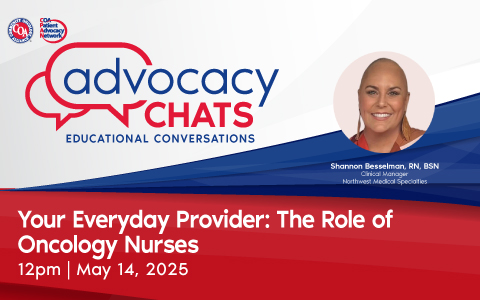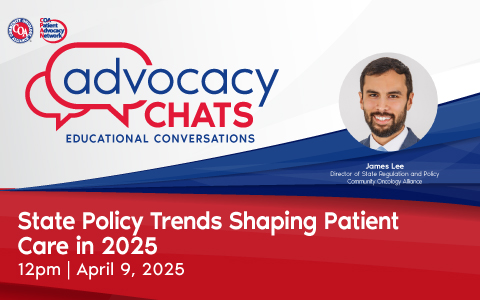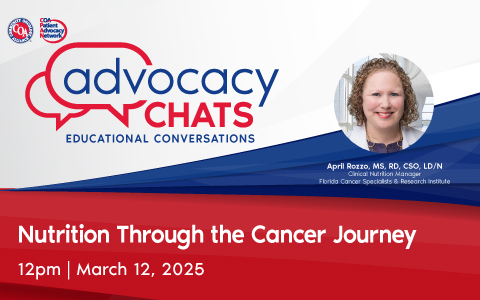The Psychosocial Impact of Cancer
As a national advocacy organization, CPAN works with other advocacy groups including CancerCare, founded in 1944, making it one of the oldest cancer advocacy organizations. CPAN has worked frequently with CancerCare and welcomed this month’s guest speaker, Lauren Chatalian, MSW, LCSW, the organization’s director of advocacy. In addition to explaining the work of CancerCare, this chat examined the emotional impact of a cancer diagnosis and the ongoing challenges patients with cancer face.
Initial Thoughts & Emotions
The psychosocial impact of cancer begins with the diagnosis. Those who have been diagnosed with cancer may feel many mixed emotions, including fear, shock, denial, confusion, and sadness. A cancer diagnosis can be challenging and takes time to process, often beginning with disbelief. Common thoughts run the gamut of emotions raising questions like:
- Am I going to die?
- Why me?
- How did I get cancer?
- Did I cause this?
- Who will care for my loved ones?
Following quickly upon the diagnosis, patients are often faced with the uncertainty of who to tell and how to tell family, friends, employers, and colleagues. Patients may also be uncertain of next steps such as:
- Establishing a medical team
- Learning about and selecting a treatment option
- Questioning financial security and the cost of cancer treatment
- Determining insurance coverage
- Addressing cancer-related costs, such as getting to and from appointments, childcare, and other daily living expenses
Ongoing Impact of a Cancer Diagnosis
Individuals are impacted by cancer in many ways, most of which are ongoing over long periods of time. Initially, patients may face adjustments that require dealing with:
- Changes in physical appearance
- Changes in demeanor and affect
- Changes in movement and energy
- Experiencing symptoms of disease and side effects of treatment
- Insecurity and diminished self-esteem
For those who are working and/or have family responsibilities, there are the added concerns of:
- Questioning the ability to fulfill job responsibilities
- Managing activities of daily living and adhering to treatment schedule and/or attending appointments
- Family and childcare concerns
- Pressure of prior expectations
- Wanting to be “normal”
- Financial concerns
Rose Gerber, CPAN’s director of patient advocacy and education, herself a cancer survivor, noted that during treatment many patients will lose some weight and lose their hair, but when dressed, with a wig, and wearing make-up often do not look ill and may even receive compliments on their appearance. However, in the privacy of their homes when the wig and make-up come off, patients are faced with the stark change in their appearance and are forced to confront their cancer. This can be a shocking, difficult phenomenon that goes unnoticed by family and friends.
How Families Are Affected by Cancer

Families as a whole are affected by cancer in many ways, and each individual in the family can be affected differently. Depending on their role within the family, each individual can respond differently to a cancer diagnosis and the disruption it brings to the family dynamic. It can be difficult to know how to navigate and adjust to the changes that may occur. A cancer diagnosis in the family can also impact children’s behavior, emotions, and overall well-being.
Speaking to Children About Cancer
Communicating with loved ones and discussing a cancer diagnosis can be very challenging. This is especially true when dealing with children because of their level of understanding. Approaching the first conversation with children can be daunting. However, it may be beneficial to discuss a cancer diagnosis as soon as possible. Before speaking about the diagnosis, parents may consider the following:
- Setting the tone
- Asking professionals for guidance
- What they would like to share
- When and where the conversation will take place
- Who will be present during this conversation
Explaining a Cancer Diagnosis
It is important to explain a cancer diagnosis in terms that children can best understand. This is dependent on the child’s age and attention span, as well as what a parent feels their child can comprehend. It is important to have a conversation that:
- Uses words that are common and familiar
- Focuses on providing accurate information and being honest
- Utilizes the term “cancer”
- Important that younger children understand cancer is not something they can “catch”
- Acknowledges that everything does not need to be shared in one conversation
- It is important that children understand what is happening
- Trying to cover everything in one conversation may be overwhelming and too difficult to process
Initially, parents may not have answers to all the questions a child may ask. It is acceptable to say that they will check with the doctor for an answer. That becomes a commitment to get an answer for the child.
For older children and teenagers, parents must recognize that although their children will listen, they will also go to social media and the internet for answers to questions they may not voice to their parents. It is important to share that everyone’s diagnosis is unique to themselves. What happens to one may not happen to others. Parents need to be aware that older children may access information that is not applicable to their parent but can be scary, nonetheless. Parents need to make certain their older children have an accurate understanding of the specific situation. It may be appropriate to expand into the specific diagnosis, the treatment, and a brief timeline.
For the younger child, a conversation using uncomplicated and concrete terms may be sufficient. This can be as simple as:
“Mom is sick with an illness called “cancer.” The cancer happened on its own – nobody did anything to make it happen. My doctors are doing the best they can to take care of me, and I am going to do everything possible to get better.”
For children of all ages, it is important to address how their daily routine may be affected, who will be caring for them, and how things may change. For the younger child, that may be explaining who will be picking them up from school. For the older child, it may be discussing what new responsibilities they may have to assume within the family. Again, this is highly dependent on the child’s age.
- Ages 0-3 years – may not understand anything about cancer, but may sense a change in family routine and needs to be assured that this change is not harmful
- Ages 3-7 years – needs to understand cancer in simple terms, know they did not cause the cancer, it is not their fault, and it is not contagious
- Ages 7-12 – can understand more detail and accept and process more information, less likely to think cancer is their “fault,” and more likely to understand the role of treatment
- Ages 12-18 – will have a more complex understanding of cancer, will understand the relationship between the illness, symptoms, and treatment, are likely to get information from other sources in addition to their parents, and may want more involvement in decisions
Moving Forward
When diagnosed, it will be unknown how long families will be managing cancer-related concerns.
- When treatment concludes, there are many adjustments that continue to occur
- Impact does not conclude when treatment does
- Factors such as returning to work, a change in the family routine, and other considerations can continue well beyond the end of treatment
- Important to openly communicate about the impact cancer continues to have on family members throughout this experience
- Honesty, even if the news is not always good, and making sure children hear good or bad news directly from their parents whenever possible is important
Emotional Support
A cancer diagnosis is overwhelming. Additional support for families can be helpful as they face new challenges together.
- Support services are available to those impacted by cancer, including children
- Encouraging children to express current feelings and concerns
- Being mindful of any emotional changes in children that might indicate they are stressed from worry
- Discussing outlets children can utilize when feeling upset or overwhelmed
- Creative activities
- Sports
- Allowing space for children to feel heard
- Additional family time
- Ongoing discussions
- Continued check-ins
- Modeling and explaining aspects of self-care
- Determining individual and family coping mechanisms
- Continuing to instill one’s foundation as a family and approach challenges as a team
- Supporting one another
CancerCare Services

CancerCare is a national, non-profit organization providing free support services to help people manage the emotional, practical, and financial aspects of cancer. To speak with an oncology social worker, patients, caregivers, and family members can call the toll-free CancerCare HOPEline:
800-813-HOPE (4673)
Or go online to learn more about CancerCare’s programs and services at:
September Advocacy Summit
In lieu of a September Advocacy Chat, CPAN will host the 2022 Community Oncology Advocacy Summit. This virtual event, available to all advocates at no charge, is an exciting day that will recharge the advocacy spirit and inform attendees on the latest issues impacting cancer care. Industry experts and oncologists from around the country will educate attendees on how to have influence. By learning about the biggest issues facing community oncology, attendees will discover the most effective ways to communicate with legislators and policymakers. Sessions will include presentations and panel discussions about biosimilars, defining “quality cancer care,” disparities in cancer care, and a cancer policy update.
The Summit is on:
Wednesday, September 28, 2022
10:00 A.M. – 2:30 P.M. ET
Registration is now open at HERE.
The CPAN Advocacy Chats are regular virtual events and will return on
Wednesday, October 12, 2022
12:00 P.M. – 12:30 P.M. ET
This event will be part of our virtual CPAN Advocacy Chats series – short, monthly educational webinars on key cancer issues and the policies that impact them. Each month will feature a new topic and special guests joining us. Patients, survivors, caregivers, and other cancer care advocates are all invited to join us for these free, interactive, virtual events!
CPAN Advocacy Chats are regular virtual 30-minute educational conversations about cancer advocacy and policy with a guest speaker invited to discuss issues important to patients and advocates. Summaries of previous Advocacy Chats are available on the CPAN website.
Past Advocacy Chats
